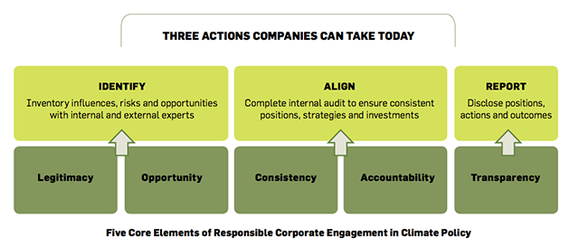"We need a trade association for industries that don't exist yet." This is what Thomas Lingard, VP of global policy and advocacy at Unilever, said to me at an event recently. We were discussing Senator Whitehouse's article on the dearth of pro-climate lobbyists in Washington, which has sparked a global conversation about corporate engagement on climate policy.
This conversation has been a long time coming. Trade associations exist to protect and promote the interest of their corporate members. They play a powerful role in amplifying the voice of business, and this in turn serves an important function in creating policy.
With the emerging understanding of the business case for climate action however, we need to ask - does the current status quo meet the needs of business?
Corporations have become very vocal in expressing their support and willingness to tackle climate change. The run up to COP21 was testament to this. Business stepped forward to show that it wanted clear, long-term climate policy. This included the boards of over 800 companies telling CDP that they would support an ambitious international agreement to tackle climate change. It helped do the trick. The world - and business - got the climate deal it needed. Momentum behind the deal is so strong that what was once thought to be a miracle has now entered the realms of the possible: the Paris Agreement entering into force well before 2020.
There is no better chance for the world to limit temperature rises to below 2°C than securing early implementation of the Paris climate accord.
Yet, without trade associations that represent the voice of climate-savvy businesses and the companies and industries that will emerge as we undergo this low-carbon transition, will we be able to achieve our below 2°C goal?
The shifting economics
To understand why progress on corporate engagement on climate policy has been slow, we need to understand how the economic understanding of climate change has evolved. For many years mainstream economics suggested that taking climate action would be costly, and this would be an undue burden on business. That paradigm has firmly shifted. Beginning with the influential Stern review, published nearly ten years ago in the UK, report after report has warned of one simple fact: left unchecked, climate change will devastate our economy.
According to the White House this cost would amount to US$150 billion a year - or 0.9% of global economic output - annually if we allowed temperatures to rise to 3°C above pre-industrial levels. A temperature rise of above that would incur even greater losses.
This understanding has become so mainstream that the World Economic Forum (WEF) ranked inaction on climate change as by far the greatest global economic risk of 2016. WEF also note however that the historic Paris Agreement offers business "a license not only to implement climate-friendly practices but also to innovate and develop the next generation of solutions."
Arguably the truly catalytic shifts we are seeing in global action on climate change have come about not because of the understanding of these risks, but because of the understanding of the opportunities from acting.
This is especially true for the private sector - business and investors will innovate because they have spotted new market opportunities from driving low-carbon growth.
Companies disclosing through CDP have clearly understood this business opportunity. That is why since 2010 the number of companies delivering emissions reduction activities has increased from 47% to 89%.
Similarly that is also why 400 companies (and counting) have made more than 700 separate commitments to action on climate change through the We Mean Business coalition, which CDP is a founding member of.
By signing these commitments, companies are making a statement of intent about the impact they want to have on limiting global warming. This includes procuring 100% renewable electricity, to setting emissions reduction targets based on climate science. As attention turns to how nations implement the Paris Agreement, one commitment in particular stands out: the business pledge on responsible engagement on climate policy.
The new direction for business
If we are to achieve the ambitious goals set within the Paris Agreement, companies must push governments to act, but they must also be transparent about what they are saying to governments. For the fourth year running now CDP is asking companies to publicly report this information - including on what measures they are taking when their climate policies differ from those of trade associations of which they are board members.
Our analysis of this data shows that the climate policy positions of individual companies are often not reflected in the policies of the trade associations that represent them. This is why we and WMB have invited companies to commit to responsible policy engagement.
Specifically, companies are being asked to follow three actions that would put responsible policy engagement into practice - identify the ways in which the business currently influences climate policy, align their words with actions and report on policy positions and influence. These steps follow the recommendations set out in the UN Global Compact's 'Guide for positive corporate influence.'
Nearly 120 companies have signed up to this commitment so far, including BT group, Coca-Cola HBC AG, NRG Energy Inc and Unilever. As the language of the commitment indicates, responsible corporate engagement can only be achieved through a process that will establish what best practice looks like. These companies are signing up to take business in a whole new direction on climate advocacy - and the understanding of the economic benefits of climate action will be the wind in their sails.
Where the low-carbon business leaders of the future go, trade associations must, and will, follow.
